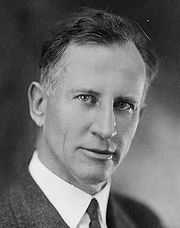Max Mason
From Wikipedia, the free encyclopedia
| Max Mason | |
|---|---|
 Max Mason | |
| Born |
October 26, 1877 Madison, Wisconsin |
| Died |
March 23, 1961 Claremont, California |
| Nationality | United States |
| Fields | mathematics |
| Institutions |
University of Chicago Rockefeller Foundation |
| Known for |
differential equations calculus of variations electromagnetism |

Crown Prince Gustaf Adolf of Sweden receives his doctor's diploma as an honorary doctorate from the University of Chicago from the university's president, Professor Max Mason, 1926
Charles Max Mason (October 26, 1877 – March 23, 1961), better known as Max Mason, was an American mathematician. Mason was president of the University of Chicago (1925–1929) and president of the Rockefeller Foundation (1929–1936).[1]
Mason's mathematical research interests included differential equations, the calculus of variations, and electromagnetic theory.[2]
Education
- B.Litt., 1898, University of Wisconsin-Madison
- Ph.D., Mathematics, University of Göttingen, 1903.
- Dissertation: "Randwertaufgaben bei gewöhnlichen Differentialgleichungen" (Boundary value functions with ordinary differential equations)
- Advisor: Hilbert
Career
- Massachusetts Institute of Technology (MIT), 1903–1904, Instructor of Mathematics.
- Yale University, 1904–1908, Assistant Professor of Mathematics.
- University of Wisconsin–Madison, 1908–1909, University of Wisconsin–Madison, Associate Professor of Mathematics.
- University of Wisconsin–Madison, 1909–1925, Professor of Physics.
- National Research Council, 1917–1919, Submarine Committee. (Invented a submarine detection device, which was the basis for sonar detectors used in World War II.)
- University of Chicago, 1925–1928, President.
- Rockefeller Foundation, 1928–1929, Director, Natural Sciences Division.
- Rockefeller Foundation, 1929–1936, President.
- Palomar Observatory (California), 1936–1949, Chairman of the team directing the construction of the observatory.
On May 2, 1945 he appeared on Edgar Bergen's radio show to chat about the new observatory and trade jokes with Charlie McCarthy.[citation needed]
External links
- Mathematicians: Charles Max Mason from the School of Mathematical and Computational Sciences, University of St. Andrews, Scotland
- Max Mason at the Mathematics Genealogy Project
- Max Mason from the University of Chicago
- National Academy of Sciences Biographical Memoir
| Academic offices | ||
|---|---|---|
| Preceded by Ernest DeWitt Burton |
President of the University of Chicago 1925—1928 |
Succeeded by Robert Maynard Hutchins |
- ↑ "Obituary: Max Mason". Physics Today 14 (5): 78. May 1961. doi:10.1063/1.3057580.
- ↑ http://www-history.mcs.st-andrews.ac.uk/Biographies/Mason.html
This article is issued from Wikipedia. The text is available under the Creative Commons Attribution/Share Alike; additional terms may apply for the media files.